Hassan Ibrahim | Hani Abdullah | Nour al-Haj
For decades, the Palestinian cause has been present in the vocabulary and literature of the Syrian regime, which clung to the narrative of “resistance and defiance.” Palestine was a “central issue” in the speeches of Hafez al-Assad and later his son Bashar, who attacked under the cover of the cause countries both Arab and foreign, adopting in his rhetoric the idea of defending the rights of the Palestinian people, relying on Syria being part of the axis of resistance.
A supportive stance for the Palestinians was exposed by the consecutive crises that affected the Palestinians on their land and violations against them on Syrian territory, at a time when the Israeli war has been ongoing for about 200 days on Gaza, recording more than 33,000 deaths, and was met by the Syrian regime with condemnation, mourning, and news reporting, interspersed with anonymous shellfire from Syrian territory toward the occupied Golan, and responses confined to statements.
Besides not exceeding statements, what is tangible is Assad distancing himself from what is happening in Gaza, and what happens on Syrian territory as well, after the ignition of what looks to be an Israeli-Iranian confrontation in Damascus, with the world’s eyes turned to Tehran’s response to Israel’s targeting of its consulate in Syria. Assad spent the Eid al-Fitr holidays in public squares.
The Syrian regime’s positions did not exceed the level of statements and reflect a distancing from engaging in any significant clash or interventions, contradicting Bashar al-Assad’s narrative when he said after taking the constitutional oath on July 17, 2021, that Syria loses when it believes that neutrality is a policy, and wins when it understands that the closest of these issues is the Palestinian cause and “the Palestinians are our brothers and our commitment towards their cause and their rights is firm and unchangeable by events or circumstances nor betrayal or hypocrisy.”
Enab Baladi in this file highlights the relationship between the Syrian regime and the Palestinian movements and reviews indicators and positions taken by Assad to dodge the Gaza war domestically and regionally, and discusses with specialized researchers and experts the reasons behind his distancing from taking substantial steps, and the losses and gains harvested from that.
A convenience relationship with Palestinian movements
The Palestine Liberation Organization (PLO) was founded in 1964, with the goal of reorganizing the Palestinian people and presenting them as a unified entity, not merely as refugees. However, its status in Syria was complicated amid a complex relationship with the Assad regime.
Despite the Palestine Liberation Organization declaring its political neutrality towards the Syrian matter, positions by leadership ranks in the organization contributed to covering for the responsible and involved parties in the regime’s crimes of random bombing, siege, starvation, and detention of residents in the Yarmouk camp. Pro-regime factions (the General Command, As-Sa’iqa, Fatah al-Intifada and Popular Front for the Liberation of Palestine (PFLP) along with other militias, and the Palestinian Liberation Army (PLA) actively participated in combat alongside regime forces.
Statements were issued by leadership figures in Fatah al-Intifada and the Palestine Liberation Organization like Ahmad Majdalani, Abbas Zaki, and Leila Khaled, which justified the regime’s crimes in the Yarmouk camp.
Although the Palestinian Liberation Army is a military institution belonging to the Palestine Liberation Organization, Syrian authorities have controlled its leadership and units (operating in Syria since 1969) since the era of Hafez al-Assad. Since 2011, the Syrian regime has exploited the Palestinian Liberation Army by throwing it into the front lines against opposition factions.
Hamas, the Islamic Resistance Movement, has historic ties with the Muslim Brotherhood, which opposed the Assad family’s control over the government in Syria. Following the outbreak of the revolution in Syria in 2011, leaders from Hamas openly supported the protests in Syria, severed relations with the regime government, closed its offices in Damascus, and left Syrian territories.
In 2021, it moved again towards rapprochement with the regime, mediated by Lebanon’s Hezbollah. Then, a delegation from the Palestinian factions visited Damascus to meet Assad on October 19, 2022, and both parties agreed to resume relations and “turn over a new leaf,” yet in August 2023, Bashar al-Assad described Hamas’s position as “a mix of betrayal and hypocrisy,” because it claimed resistance, and that the relationship between them was on general principle.
Mahmoud Hussein, a Syrian researcher in conflict studies, sees that the Syrian regime’s handling of the Palestinian presence for decades (from the era of father Hafez to son Bashar) has not changed, and is purely opportunistic, focusing only on what serves its existence.
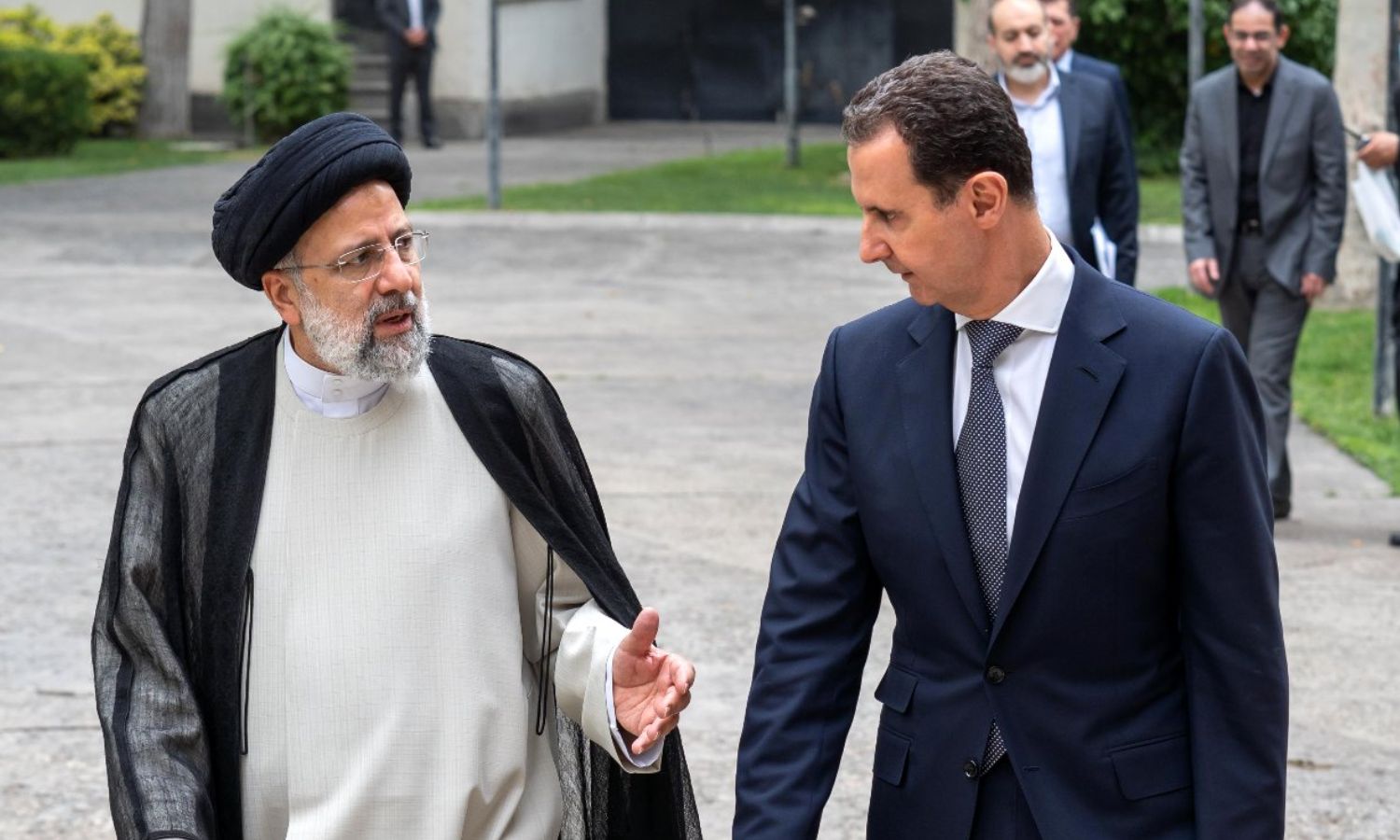
Iranian President Ibrahim Raisi and head of the Syrian regime Bashar al-Assad in Tehran – May 8, 2022 (Syrian Presidency)
Violations against Palestinians in Syria
The regime’s forces policies against Palestinians on the ground differ from Assad’s speeches, similar to the Syrian public’s situation, as documented by the Syrian Network for Human Rights (SNHR) – 3207 Palestinian refugees were killed by regime forces since March 2011 until October 2022, along with 2721 Palestinian refugees still undergoing detention or forced disappearance.
The Action Group for Palestinians of Syria (AGPS) recorded 4261 Palestinian refugee deaths in Syria, and 3087 people detained among them 333 missing, from March 2011 until December 2023, across various regions in Syria.
Outside the equation
Bashar al-Assad’s first statement on October 12, 2023, after 1537 people were killed and 6612 injured in the entire Gaza Strip, i.e., five days after the Israeli war began, was limited to condemning the crimes committed by Israel against Palestinians.
Following the statement, a series of declarations were issued by the Syrian Ministry of Foreign Affairs, condemning what is happening in the besieged sector against Palestinians, but the diplomatic language it adopted did not go beyond condemnation and denunciation.
Domestically, the Syrian regime initially restricted solidarity stands with Gaza, and later decided to ban them except with security approval.
The first solidarity demonstration with Gaza after the operation (Al-Aqsa Flood) took place on October 10, 2023, in Arnous Square in central Damascus. Yet, when the chants grew louder and demonstrators became more enthusiastic, security personnel rushed to disperse them, and Bashar al-Assad’s pictures soon increased with chants for him instead of Gaza.
The Action Group for Palestinians of Syria stated that the instructions came based on security and political assessments from al-Assad that indicate that organizing such stands might provoke the anger of Israel and the United States, and pose a risk of military intervention by them, noting that granting security approval takes weeks and may result in refusal.
During the Arab-Islamic summit hosted in Riyadh in November 2023, al-Assad stated, “Gaza was never the issue; Palestine is the issue and Gaza epitomizes its essence and expresses vividly the suffering of its people about the Palestinian cause,” urging Arab countries to possess real political tools, not just declarations, including stopping any political track with Israel.
The regime’s media during the coverage of the war on Gaza focused on Israel’s aggressions, while completely ignoring Hamas, which dominated the Palestinian political scene during the war, considered by analysts and research centers as a continuation of the regime’s “resentment” towards the movement.
Social activity in another world
Bashar al-Assad’s apparitions during the Eid al-Fitr period (April 10 to 12) coincided with intense discussions regarding the possibility of Iran retaliating against Israel after its bombing of a building adjacent to the Iranian consulate in Damascus in early April.
Al-Assad performed the Eid al-Fitr prayers at the Al-Taqwa mosque in the capital, Damascus, on April 10, then listened to a sermon that lasted about ten minutes, dominated by political rhetoric from its beginning, containing messages suggesting Syria is the “axis of resistance” fighting extremism and attacking “modern liberalism.”
Then, al-Assad and his wife Asma appeared on the first day of Eid al-Fitr in a video recording with children from the Women’s Mabarrah Society and Life Melody Homes featuring various scenes where they appeared playing with the children.
On April 12, while the world was preoccupied with the possibilities of Iranian retaliation and a potential Israeli response, and the possibility of an escalation into open conflict, al-Assad appeared with his wife and children in the streets of old Damascus, as if he was in another world, without mentioning specific details about the place in Damascus they visited, trying to convey an indifferent stance to the ongoing threats between Tehran and Tel Aviv on Syrian soil.
Away from the axis of resistance cornerstones
Since the beginning of the Israeli escalation, the pace of moves of the axis of resistance has risen in terms of communications and political meetings with figures and leaders from Hamas, whether with Iranian officials or others in Hezbollah in Lebanon, while the Syrian regime did not announce any communication with political representatives in the movement, nor mentioned its name in the official and affiliated media, being the least present at the meeting level with the axis parties.
At the military level, since Al-Aqsa Flood, only between 20 and 30 missile or various projectile attacks from Syria on the occupied southern lands of Syria have occurred, almost all of which fell in open areas and did not lead to injuries, while Israel responded with artillery shelling, and some air raids on the launching sites.
Khaled Khalil, a journalist specializing in Israeli affairs, considered that the most prominent indicator that showed al-Assad’s disengagement from the Gaza war, was his lack of comment or any speech on Jerusalem Day, on April 5, in order to reinforce the messages he wants to deliver to the world that he stands neutral unlike what was expected of him as being “part of the axis of resistance.”
Al-Assad was absent from any comment towards the Jerusalem day, while the rest of the axis of resistance participated, including the Iranian President, Ibrahim Raisi, Hezbollah’s Secretary-General, Hassan Nasrallah, the Head of the Political Bureau of Hamas, Ismail Haniyeh, the leader of the Houthi group in Yemen, Abdul Malik al-Houthi, and a representative of the Islamic Resistance in Iraq.
Khalil added to Enab Baladi that al-Assad continuously tries to send messages and indicators confirming his neutrality and non-engagement in the Gaza war, as at the height of the recent tension between Iran and Israel (after the latter targeted the Iranian consulate building in central Damascus), al-Assad appeared a week later with his wife having Ramadan’s Iftar meal in Tartus, and after several days, he appeared again inside a restaurant in Damascus’ Bab Sharqi, telling the world that he is “out of the equation.”
Al-Assad’s neutrality even appeared at the military level, as Israel intensified its military strikes in Syria during the past months, and even the official Syrian news agency (SANA) previously announced interceptions of Israeli strikes, while it did not announce that at the two Israeli strikes in April, according to Khalil who wondered how al-Assad, who did not defend his country against the strikes from Tel Aviv, would participate in responding to Israel for waging a barbaric war on Gaza?
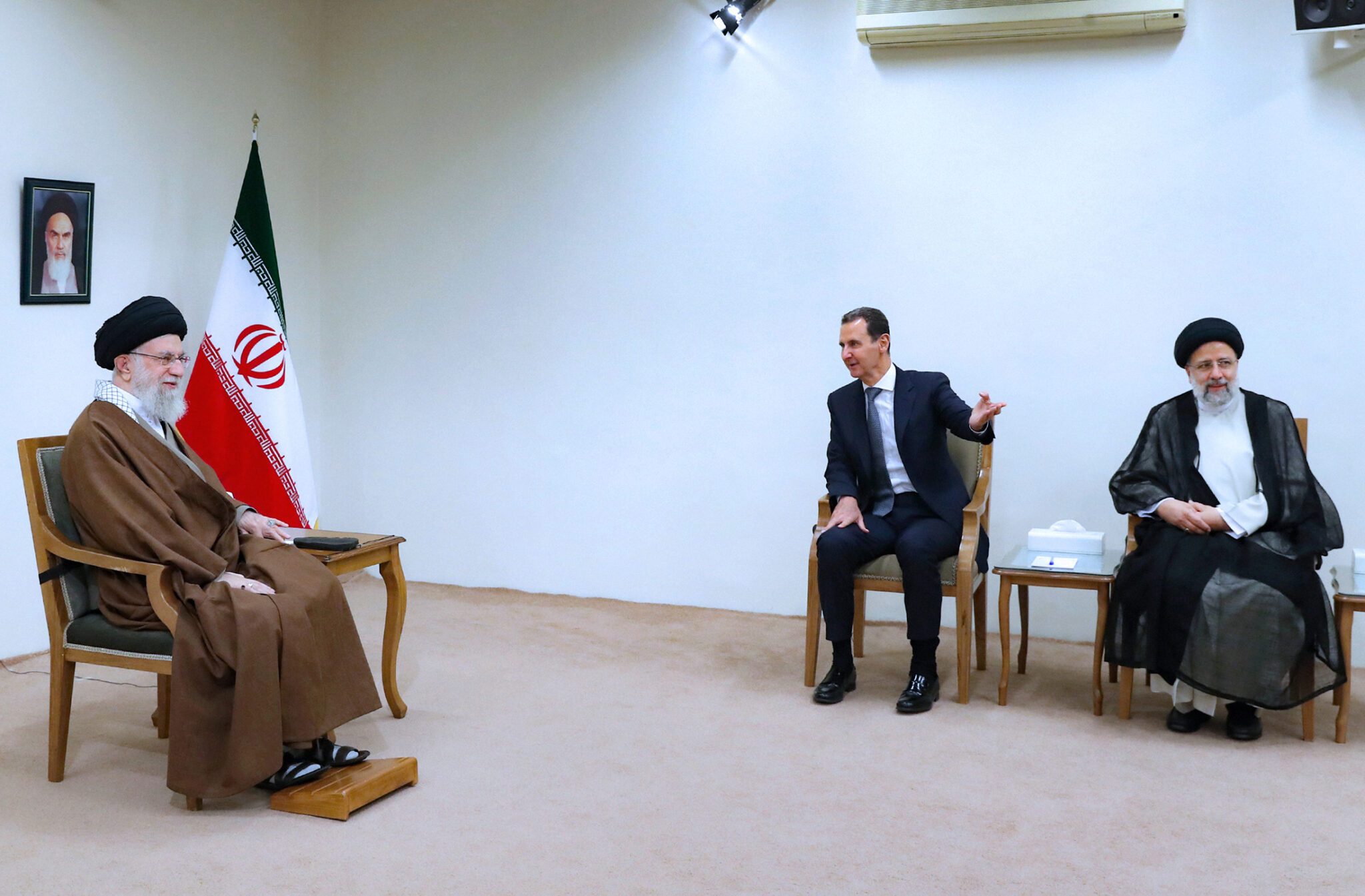
From the right, the Iranian President Ibrahim Raisi, Syrian regime leader Bashar al-Assad, and Iran’s Supreme Leader Ayatollah Khomeini in Tehran – May 8, 2022 (AP)
Complex situations
On October 7, 2023, the al-Qassam Brigades, the military wing of Hamas, carried out an operation “Al-Aqsa Flood” on settlements around the Gaza Strip without prior preparation, which was met with a severe Israeli escalation that resulted in aerial targeting of residential areas and vital facilities and a ground invasion and continuous bombardment to this day.
This operation and the ongoing Israeli response that followed came at a time when the Syrian scene is becoming increasingly complex, and a war has been waged by the regime on Syrian lands for 13 years to maintain the levers of governance, against the demands of the Syrians calling for its overthrow since 2011.
Regional and international entanglements, different military forces on Syrian lands, an exhausted economic reality, “allied” and “axis of resistance” countries and “hostile” countries, and tumultuous relationships, all linked to the position of the Syrian regime regarding what is happening in Gaza.
By July 2023, the number of military sites of foreign powers in Syria had reached 830, distributed under the dominance of influential countries and entities on the ground (the US-led International Coalition, Russia, Turkey, and Iran).
The economy in Syria has faced crises reaching a state of dysfunction, with the economic losses estimated at $442 billion US dollars over eight years of war, according to a 2020 United Nations report, divided between $117.7 billion from the physical capital destruction value, and $324.5 billion in the loss of gross domestic product.
Since August 2023, the governorate of As-Suwayda continues its civil peaceful protests demanding political change and the overthrow of the Syrian regime.
From the axis of resistance to new allies
After years of estrangement, Bashar al-Assad’s appearance on the Arab stage has emerged, through the regime’s return to the Arab League in May 2023, after a 12-year membership freeze, followed by an invitation from Riyadh for him to attend the Arab Summit, and since then, the Syrian file has seen a state of political activity and movement, spearheaded by Saudi Arabia, which took it upon itself to bring the regime back to the Arab fold.
Before that, March 2022 witnessed Bashar al-Assad’s visit to the United Arab Emirates (which has relations with Israel), and it was his first visit to an Arab country since the 2011 revolution began.
An Emirati official at the time said that Assad’s visit was part of a broader new strategy to talk to everyone in the region and try to “have no enemies,” pointing to a new approach followed by the UAE based on diplomacy and de-escalation.
Moreover, the Jordanian activity in the Syrian file has been prominent with the talk of an “initiative” in 2021 called “No Paper,” and came back strongly during the year 2023, through what was called the “Jordanian Initiative” presented by Amman for a political solution in Syria, including demands, proposals, and details requiring the regime to take many measures on the ground on the one hand, and what the regime aspires to achieve through the gateway of this “initiative” on the other hand, and it was based on the principle of “supply and demand.”
Warnings against intervention
Two days after the Al-Aqsa Flood, the UAE conveyed an Israeli warning to Bashar al-Assad to stay out of the ongoing war in Gaza and to prevent southern Syria from being used as a launchpad for operations targeting Israel, according to a leak reported by the Axios website from sources familiar with the UAE’s diplomatic efforts.
UAE officials sent their messages to “high-level” Syrian officials and briefed the administration of US President Joe Biden on their communications with the Syrians, the site noted.
With any talk of Assad’s intervention in a conflict or war with Israel, a famous documented lecture before the US Congress by Andrew Exum, who previously served as the Deputy Assistant Secretary of Defense for Middle East Policy, comes to the fore, stating that the collapse of the Syrian regime threatens Israel’s security and poses a risk to America’s interests in the region.
Exum mentioned that it was the United States who initiated contact and coordination with Russia to intervene in Syria after the regime was about to fall, noting that by the end of 2015, both the United States and Israel began to fear the collapse of al-Assad’s regime.
Researcher Mahmoud al-Hussein told Enab Baladi that the Syrian regime’s relationship with Israel is entirely controlled, and the regime has never posed a danger or threat to Israel’s security; on the contrary, it has always been keen to provide its security services to Tel Aviv in exchange for maintaining Assad’s survival.
The researcher pointed out the nature of these services, represented by providing information or perhaps contributing in some way to the assassinations carried out by the Israelis against Iranian figures in Syria.
Al-Hussein added that if the Syrian regime could not control the Iranian presence on its territory, it is keen to provide these security services to the Israelis, as an old and new message, with Israel’s certainty that this regime does not and will not pose any threat to its security and existence.
The Syrian regime is a strategic ally of Russia and Iran, and both countries have contributed to maintaining al-Assad and keeping him in power. Damascus also holds vital and strategic importance for Moscow and Tehran, and al-Assad’s positions align with the interests of these two countries.
As of July 2023, Iran owns 570 military sites in Syria, possessing a broad influence and presence on Syrian territory, the largest volume of foreign influence on the Syrian map, while Russia owns 105 military sites.
Maan Talaa, a researcher at the Omran Center for Strategic Studies, told Enab Baladi that the Syrian regime is trying to align with the Iranian strategy aimed at framing the conflict and also limiting its extension beyond the Palestinian borders.
Talaa believes that the regime’s behavior is based on not exceeding the rules of the game, amidst the complex and interconnected crises in the region, knowing that entangling its threads is not in its interest, and would draw an intervention in Syria that it neither wants nor can withstand.
According to Mahmoud al-Hussein, a Syrian researcher in conflict studies, the regime’s stance on the war on Gaza is perfectly consistent with the policies of its allies and does not conflict with them at all, considering Israel’s security as a red line that should not be touched or even approached.

Syrian regime’s president with his family in old Damascus on the third day of Eid al-Fitr – April 12, 2024 (Asma al-Assad’s Instagram account)
Rewards of neutrality
The crises Syria is experiencing on multiple levels and even disasters have revealed the regime’s search for political or economic gains, even at the cost of lives, as shown by the devastating earthquake of 2023 when the political aspect overshadowed the humanitarian response.
The matter does not only pertain to what is happening inside Syria, but the regime seeks gains from any regional or international file related to Syria or its allies that intersect with a swap or exchange of interests or benefits, raising questions about the regime’s gains and losses from its position on what is happening in Gaza.
Mohsen Mustafa, a researcher specializing in civil-military relations at the Omran Center for Strategic Studies, told Enab Baladi that it cannot be determined yet whether the regime has achieved gains from the Gaza war, and there may be economic gains from the UAE in return for not escalating against Israel.
According to Mustafa, it can be said that al-Assad’s neutrality helped ensure his forces did not suffer further material and human losses militarily, in case Israel launched attacks on military targets in Syria.
Palestinian researcher Mahmoud Zaghmout believes that the Syrian regime’s behavior in distancing itself from the events in Gaza carries many dimensions and interests, likely aiming to obtain a reward, either through political support, Arab and international, or economically through the lifting or easing of US and Western sanctions imposed on it for years, and proceeding with serious steps towards supporting the (reconstruction) project it has been promoting for some time.
Researcher Maan Talaa mentioned that one of the most significant gains al-Assad seeks in return for his neutrality in the Gaza war is to fully dedicate himself to domestic issues, using the stability of the geography and the stagnation of military fronts in Syria, which helps him evade sanctions and security control, empower some economic and social networks, control power, and prepare the civilian sector to be a partner for him.
He added that al-Assad’s disengagement from the Gaza war also helps him send messages to neighboring countries aimed at revitalizing his relationships and maintaining the regional security system, achieving a significant gain by dominating the security game in the region and asserting that he is part of this system that considers public security.
Journalist Khaled Khalil mentioned that the Syrian regime tried to distance itself from what is happening in Gaza to facilitate integration into the Arab environment and benefit from any regional settlement sponsored by the major powers that contribute to consolidating his rule and assisting him in the reconstruction file.
What did al-Assad lose?
Researcher Maan Talaa sees that Bashar al-Assad has lost what is known as the regional role that used to distinguish Syrian foreign policy, which previously had an effective role in the region. Now, it has become a playground for regional powers.
In the same context, Khaled Khalil stated that Bashar al-Assad has lost the political and media narrative established by his father over decades, portraying Syria as a “resisting” state. Now this weakness has been exposed, and he can no longer bargain with the Palestinian card as before. However, generally, the Syrian regime has nothing left to lose, as it is both elusive and submissive to Iran, with the relationship with Iran having shifted from merely an ally to complete guardianship.
According to a report by Jusoor Center for Studies, al-Assad has lost the decision of peace or war in favor of Russia and the Iranian militias, which are trying to control the decision of confrontation with Israel starting from southern Syria, hoping this will maintain his presence in the Palestinian political and media scene, and to a lesser extent, militarily.
According to the center, the Syrian regime has indeed lost one of its most prominent tools of power that it marketed regionally and internationally – the influence over the military and security decisions of Palestinian factions from the Syrian front, similar to what happened after its forces left Lebanon in 2005, which weakened its ability to influence Hezbollah to the benefit of Iran.
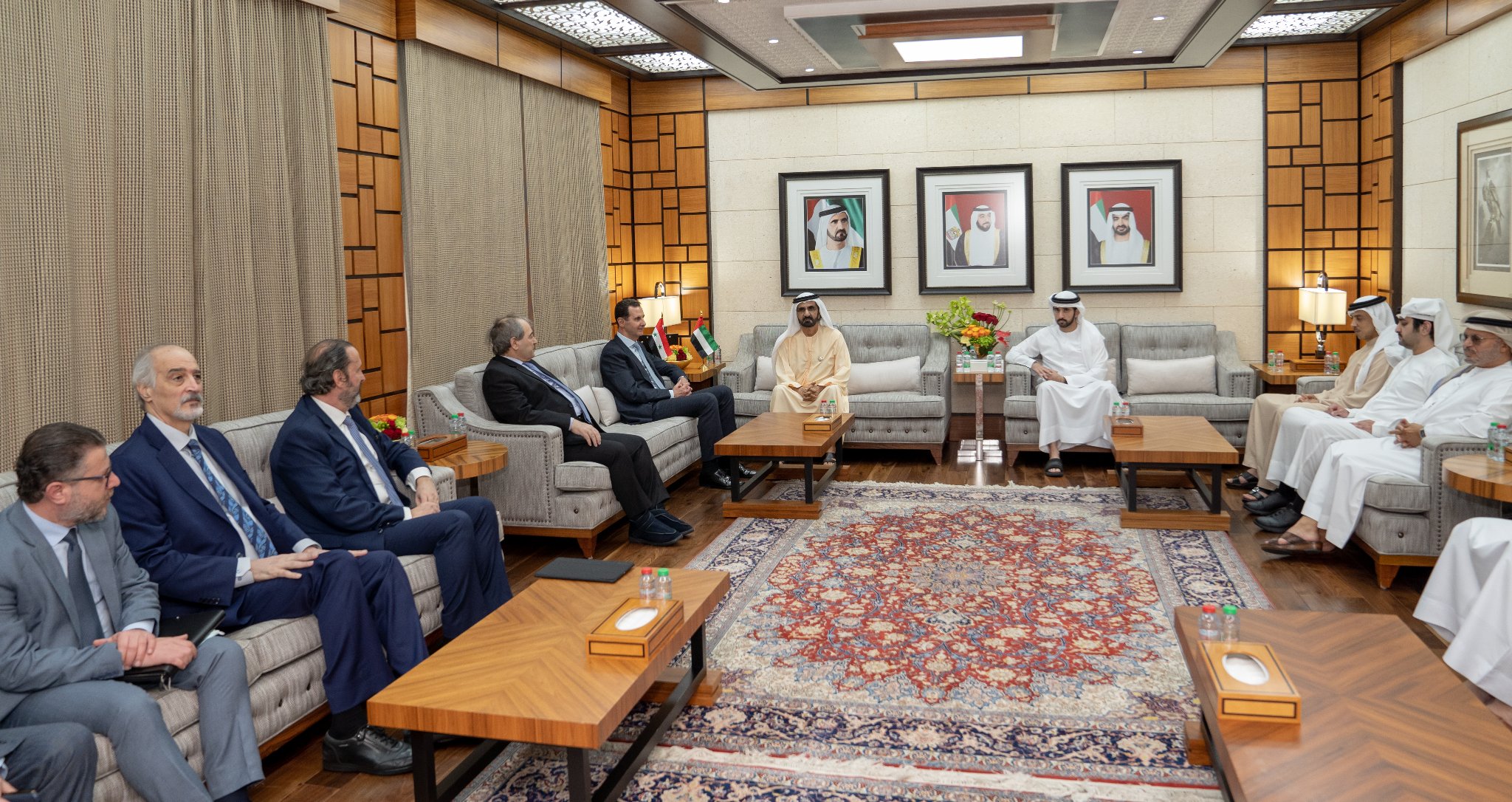
The head of the Syrian regime, Bashar al-Assad, in the Emirates on his first Arab visit after the start of the revolution in 2011 – March 18, 2022 (Syrian Presidency/Facebook)
if you think the article contain wrong information or you have additional details Send Correction
النسخة العربية من المقال
-
Follow us :












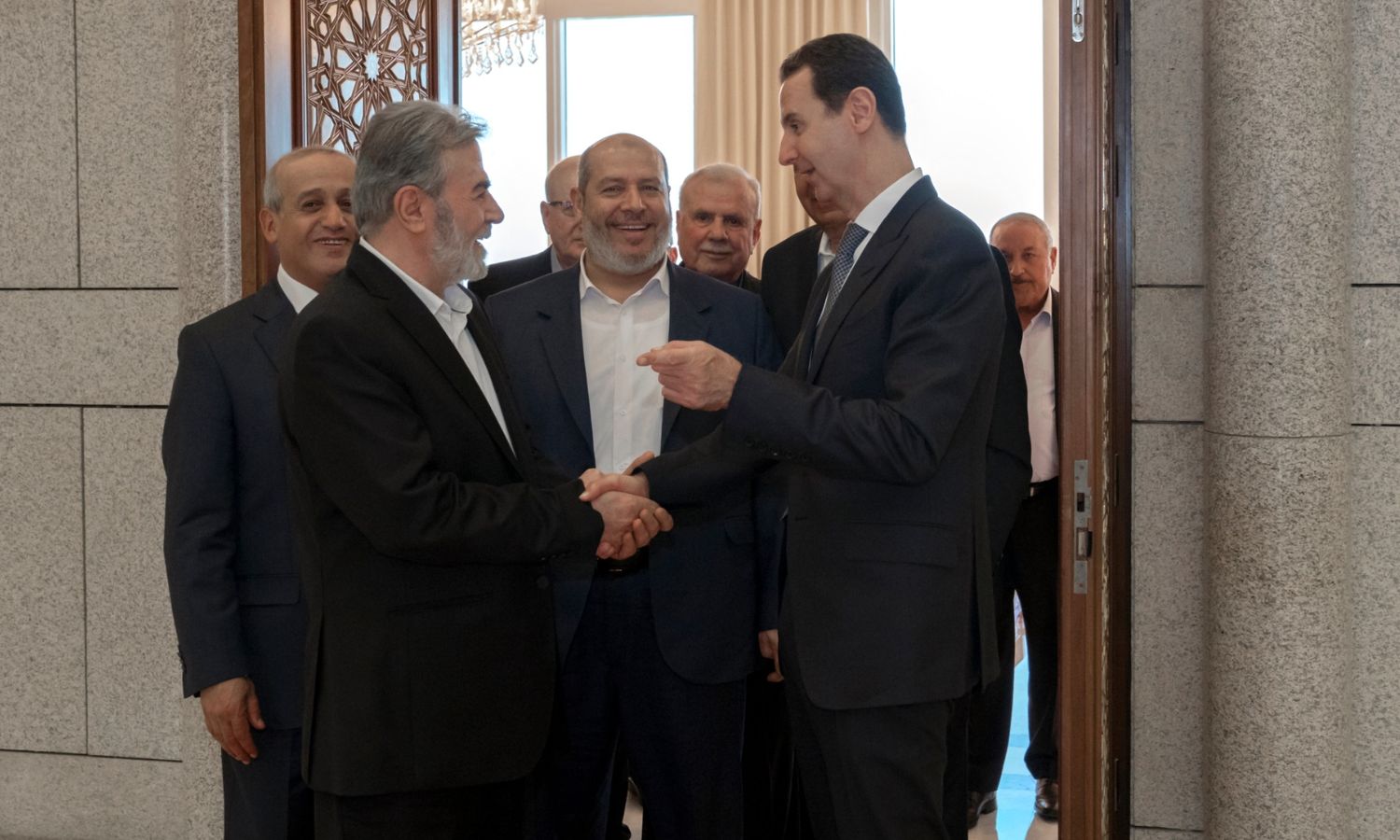
 A delegation of Palestinian factions, including Hamas and Islamic Jihad, met with Syrian regime president Bashar al-Assad in Damascus - October 19, 2022 (Syrian Presidency)
A delegation of Palestinian factions, including Hamas and Islamic Jihad, met with Syrian regime president Bashar al-Assad in Damascus - October 19, 2022 (Syrian Presidency)





 A
A
A
A
A
A
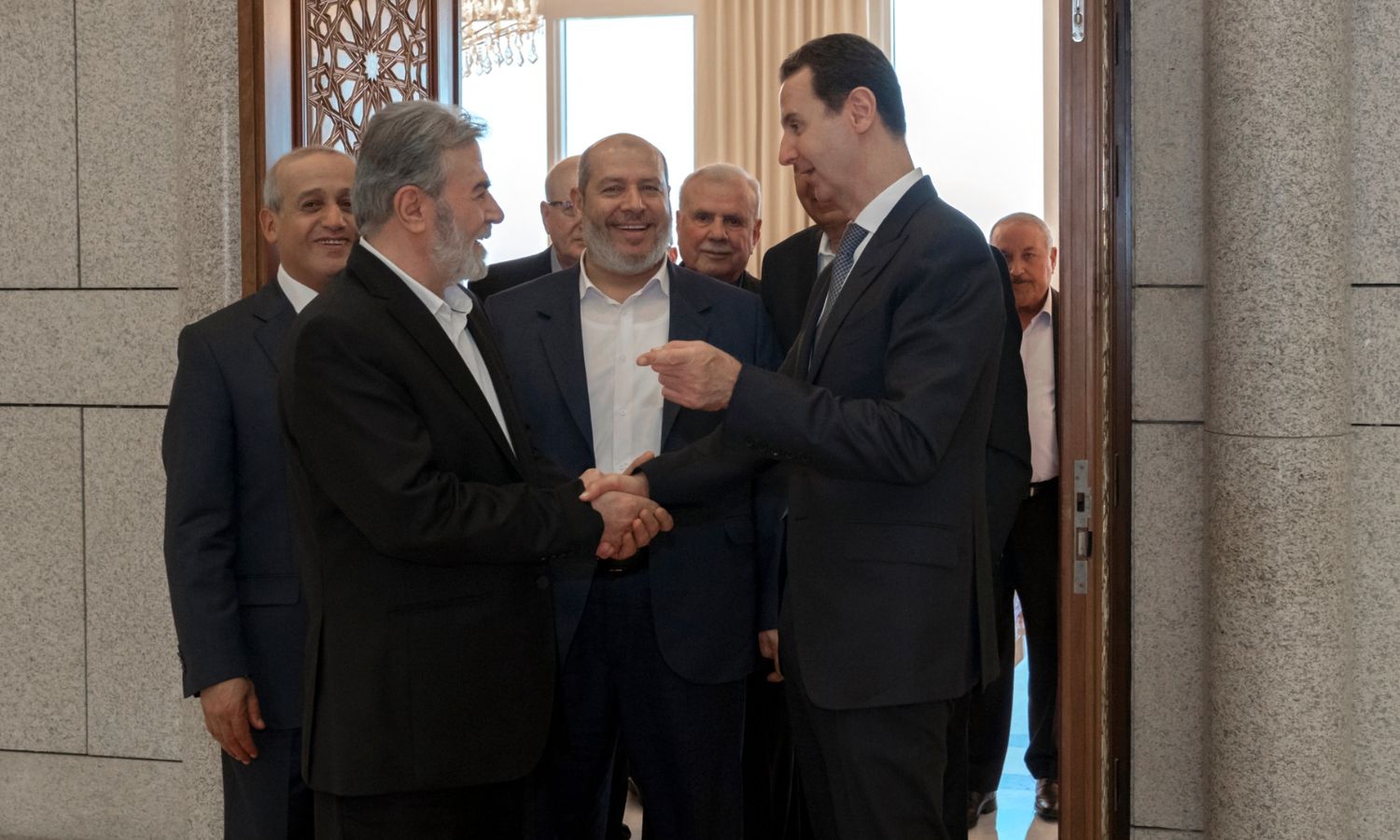
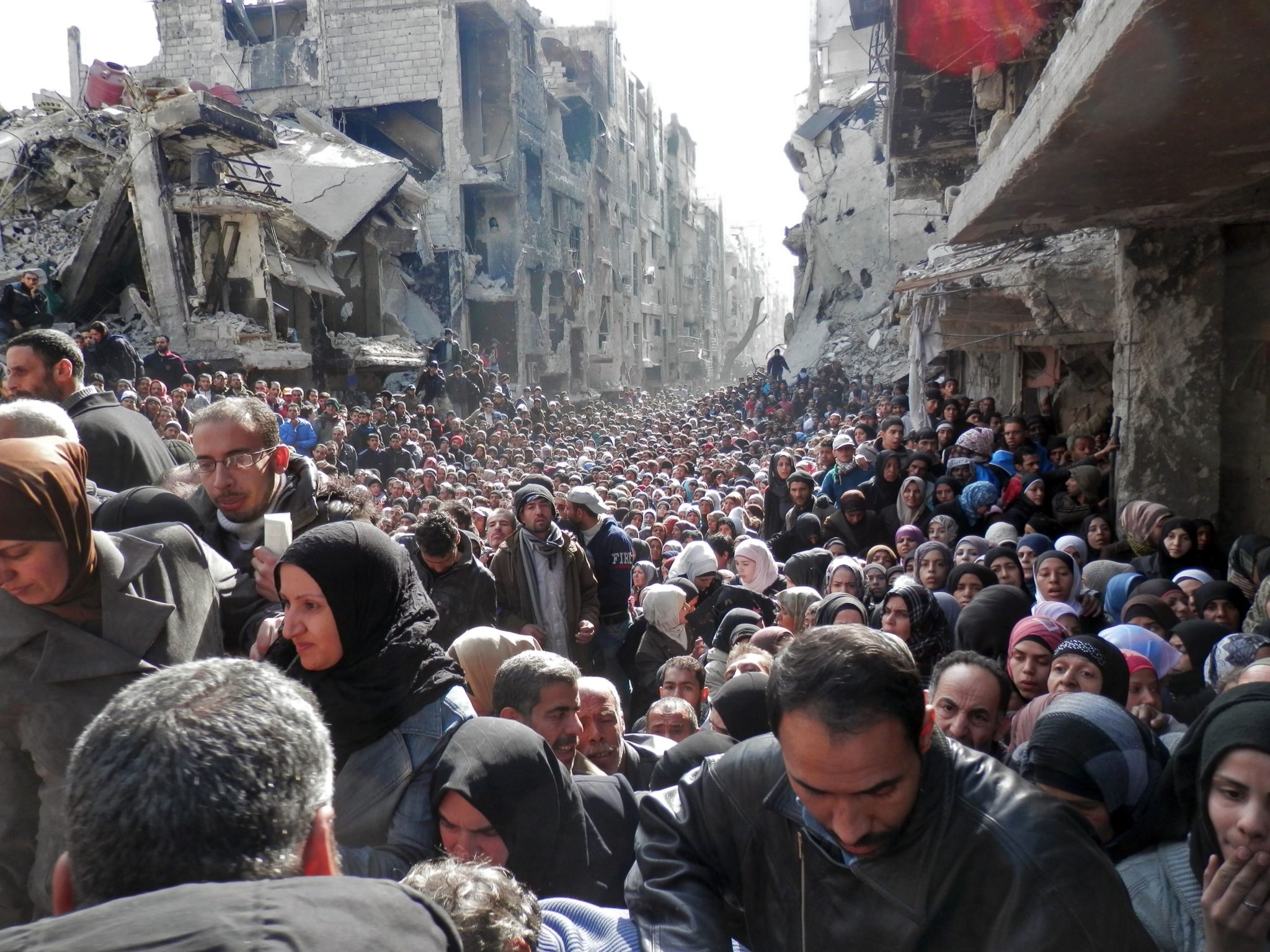


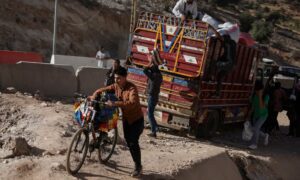

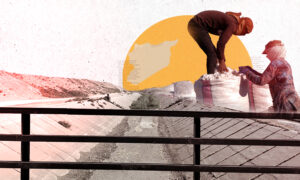
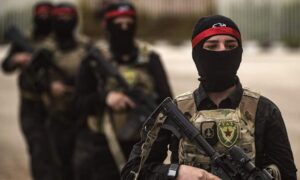
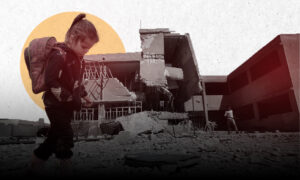
 More In-Depth
More In-Depth